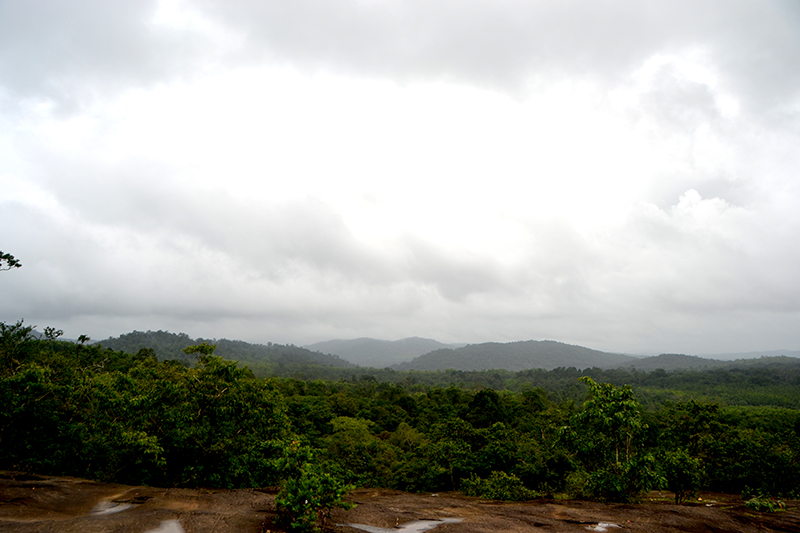The Western Ghat or Sahyadri slopes in Karnataka make the Male-nadu region. 'Male' meaning ‘hill’ or ‘rain’ and 'nadu' meaning ‘region’. Many rivers originate from this region including the Tunga, Bhadra, Kaveri and the Malaprabha. The historic Dharmastala, the famous jog falls, Agumbe ghat (town with 2nd highest and last year the highest rainfall in India and also where Malgudi Hills was shot) are some of the famous places in the Malnad region. The Malnad Cuisine tastes that we never knew existed but I think that deserves a separate post.
We hadn’t really expected to do touristy things much during our stay in the hills as we were looking for a place to process all that we had experienced thus far. While we were enjoying the rain (after a long dry spell of almost 2 weeks) and we were sitting in a little gazebo with a light drizzle all day long, our hosts at the Homestay suggested that we visit the home of the Poet Kuppali Venkatappa Puttappa popularly known by his pen name, Kuvempu. Kuvempu (1904-1994) had been conferred the Padma Vibhushan in 1988 for his contributions to modern Indian literature thought his poems, plays and novels. He is also the writer of the Karnataka State Anthem. While Kuvempu spent most of his adult life in Mysore as a professor at the Mysore University, he spent the first 15 years of his life in the region.
Kuvempu’s ancestral home is set in the beautiful Malnad landscape. The poet’s 250 years old home has been restored and converted into a museum by the Kuvempu Prathisthana. We were told that the house is a quintessential Malnad house with a courtyard in the middle and jackfruit wood pillars. Interestingly, the house itself is the only house in the village of Kuppalli.
Just about 6 kilometers from our homestay, the serenity and peace around the house with arecanut plantations in the backyard was calming. There was still remnants of the rain from earlier in the day. The house itself not only kept some of the artefacts and memorabilia of the life of the Poet but it has also retained the architecture of a Malnad home. Malnad homes are built for the monsoon, with their Mangalore tiles and sloping roofs and also the use of jackfruit wood (we were told that jackfruit wood is unique in that it expands very little with moisture, also why it is used to make musical instruments). It also has small rooms, with small windows (protecting from wind and rain) along with traditionally mud walls keeping the house cool during the summer months. However, many of the mud walls were replaced with cement during the restoration. The house gives us some glimpses of what life would have been in this region.
A short walk from the house, up the hill is a vista point from where one can see the surrounding hills and the poet apparently came to sit and think on a particular rock. The expanse of the hills with the green carpet that surrounded us was unlike anything we had seen so far in the region. While I felt at home in Theerathalli, I missed Panchgani’s clear view of the valleys and surrounding mountains from most of our drives. Because we were so deep in the midst of trees and the gradual slopes around us at any point we didn’t know how high we were, whether we were on top of a hill or in a valley.
I have not been able to find many English translations of his poetry but was told that this serene and green geography seems to come up in many of his poems. This is the one that I found called “Oh mother, Blessed am I, to be born to you”.
Oh mother, Blessed I am, to be born to you
Blessed is my soul, to be nourished by your love
I don't care if you are adorned like a queen
I don't care if thou grant every wish, like Surabhi
All I know is my courtyard is filled with the fragrance
Of your sacred presence
Of the criticisms about your lacking, I am aware
The ridicules of being backward, you had to bear
Those adorned by gold, I shun
I regard you as the glorious one
In the luster of your eyes I open my eyes
With joy I'll grow in your holy land
Thy glory I'll pen; thy name I'll call
For the fortune of your service, I reject all




